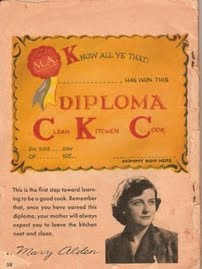Every day at seven PM I call my mother. It is four PM her time on the California coast, but despite that time difference we are both generally at about the same place in our day -- dinner time. Most days the call lasts for ten minutes. Some days when we both have a lot of say, it can last half an hour.
Every day at seven PM I am witness to my mother's decline into dementia. Her doctor and health care workers use the term Alzheimer's, but because I am not there I cannot ask them more detailed questions. I know from reading that not all dementia is Alzheimer's, and what is happening to her does not fit the way I have seen Alzheimer's described or depicted in the ubiquitous commercials for drugs and products. But then I know very little, and the disease progresses differently in different people I am told.
The most obvious symptom to me through our daily phone calls is the aphasia. She loses words. She knows what things are and what they do and what they are for, but she can no longer retrieve the names for them. Common everyday objects, events and actions escape her. She is acutely aware of this problem and struggles. Sometimes I will try to supply a word here and there, but mostly she seems to prefer to just provide round about descriptions (such as "that nosy box with pictures in the living room" for TV). She has also forgotten how to do things, like all but the most simple cooking, and can only write a check with substantial assistance from someone. Numbers and arithmetic are almost completely beyond her. She never learned to use a calculator and certainly will not now.
The biggest crisis in my mother's life at this particular point in time is that the company that provides municipal garbage and recycling pickup for her California suburb, has suddenly decided to entirely change the rules. They have delivered three big huge wheeled containers, one green, one blue and one black, and detailed written instructions on what can and cannot go in each one. My mother is utterly bewildered by this.
She has daily assistance, and I imagine that Jennifer has a much firmer grasp on what is required for properly filling these new containers. But my mother wants to be able to understand this herself, and she simply cannot get her mind around how they will store and dispose of the various types of recyclables, trash and garbage.
I feel for my mother, and her pain and anxiety. But am comforted by the knowledge that Jennifer and my brother Charlie are there to take care of the actual logistics of this particular crisis.
There is however, my own growing fear that I too am slipping down the long slippery slope to cognitive disorder. My mother is 86, and I am only 59, but I believe I see the signs and symptoms in myself.
I have had problems with word loss for more than 15 years, and it has been getting worse. Nothing like my mother. But a couple of times a week, I will be lecturing in class or talking to my husband, and suddenly will be unable to capture the right word -- not every day nouns and verbs like my mother now has difficulty with, but everyday, routine concepts of my discipline and the social sciences in general, and with descriptive adjectives and adverbs. Some weeks, when I am tired or stressed, are worse than others.
The other thing that frightens me, is my reaction to new and novel situations or the disruption of routines. I become mentally flustered, and sometimes panicked, and have the unfortunate tendency to lash out angrily at those around me (primarily my wonderful, patient husband, who deserves far better than he's gotten of late). Within moments of my outburst, I feel remorse, but the damage is already done.
If there is time to think about some thing new, figure out what is going on, what needs to be done, and then act, I'm fine. It's the situations that require an immediate response that throw me. Yet, everything I read tells me that what I need is more novelty. I need to get out of my ruts, challenge myself with new tasks, meet new people, try new places and activities -- especially physical activities -- to stimulate my mental "muscles."
Unfortunately my actual physical muscles -- or more specifically my joints -- are undermining efforts in that direction. The RA seems to be progressing. After two years, my medications no longer seem to prevent the end of the day exhaustion. Daily housework chores like dishes and feeding cats overwhelm me. Weekly chores like house cleaning and laundry -- well, it's been a long time since those were actually done on a weekly basis. It seems clear to me that it will not be long before I will need to have more help around the house than John can provide, even if he were to provide more than he already does.
How long do I have before I become like my mother? How long before I can read the words but no longer make sense of the content? How long before I can no longer remember how to work my computer, send e-mail? How long before I can no longer have a normal conversation?
What do I need to do to provide security for myself and John before that day comes? What things is it essential for me to do and say before that day comes? What legacy do I still have to leave before I can no longer communicate with the world in a meaningful fashion?



